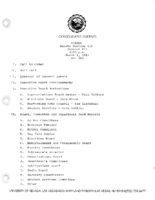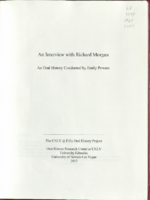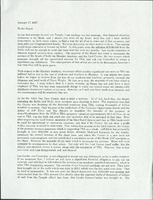Search the Special Collections and Archives Portal
Search Results

Meeting minutes for Consolidated Student Senate, University of Nevada, Las Vegas, March 01, 1983
Date
Archival Collection
Description
Text
Michael Maxwell oral history interview
Identifier
Abstract
Oral history interview with Michael Maxwell conducted by Claytee D. White on February 25, 2014 for the African Americans in Las Vegas: a Collaborative Oral History Project. In this interview, Maxwell discusses his personal history and his role as Director of Early Childhood Connection with the Las Vegas, Nevada Urban League. He describes the work he does with childcare, and how the Urban League receives funding. Maxwell also recalls his career as a teacher and administrator for the Clark County School District (CCSD). Later, Maxwell talks about the issue of school zoning in West Las Vegas, how people qualify for childcare subsidies, and the school-to-prison pipeline that many African American youth face. Lastly, Maxwell discusses the importance of having educated children in the African American community and the development of the Westside.
Archival Collection
Charles Silvestri oral history interview
Identifier
Abstract
Oral history interview with Charles Silvestri conducted by Claytee D. White on December 31, 2012 for the Boyer Early Las Vegas Oral History Project. Silvestri begins by discussing his family history and his personal history in the United States Army during the 1950s. He describes moving to Las Vegas, Nevada in 1957 after leaving the army, working as a casino dealer at The Mint Hotel and Casino and California Club while attending the University of Nevada, Las Vegas, called Nevada Southern University at the time. Silvestri then describes attending the University of Nevada, Reno to finish his degree and moving back to Las Vegas to begin his career as a teacher. Lastly, he talks about life in Las Vegas, entertainment in the city, race relations in Las Vegas during the 1960s, and the middle school that was named in his honor.
Archival Collection
Larry K. Lytle oral history interview
Identifier
Abstract
Oral history interview with Larry K. Lytle conducted by Kenneth V. Higbee on April 26, 2004 for the Public School Principalship Oral History Project. In this interview, Lytle reflects upon his 30-year career as a teacher and administrator with Nevada’s Lincoln County School District (LCSD) from the 1970s to the 2000s. He describes the process by which he became a principal, and describes his approach to fostering a safe learning environment for students and staff. He also describes how his religious beliefs shaped his approach to leadership, and how his responsibilities changed over time as he simultaneously oversaw the elementary, middle, and high school in Alamo, Nevada. He provides his opinion on schooling challenges such as standardized testing, and offers suggestions for individuals interested in pursuing school administration.
Archival Collection
Michael S. Robison oral history interview
Identifier
Abstract
Oral history interview with Dr. Michael S. Robison conducted by Harmony Ayala on November 24, 2003 for the Public School Principalship Oral History Project. In this interview, Robison reflects upon his career as a teacher and administrator with Nevada’s Douglas County School District. He discusses his experience as a principal, and also as Area and Region Superintendent. He discusses student cultural diversity within the school district and the state of Nevada, and his interactions with the Washoe tribe. He describes his personal approach to education, how his experiences shaped that approach over time, and how he interacted with students on a regular basis. He also shares his opinion on contemporary topics within schools such as overcrowding, vouchers, and violence, and offers suggestions for individuals interested in pursuing school administration.
Archival Collection
Jack Wesley Day oral history interview
Identifier
Abstract
Oral history interview with Jack Wesley Day conducted by Claytee D. White on August 19, 2015 for the Boyer Early Las Vegas Oral History Project. Day begins by discussing his upbringing and his service in the United States Army. He describes moving to Las Vegas, Nevada in 1961 to work as a teacher at Rancho High School before joining the Clark County School District administration in 1963. Day talks about race relations at Rancho High School, life in Las Vegas during the 1960s, and being the coordinator for manpower development training classes between the Nevada Department of Education, the federal government, and the Clark County School District. Day also describes the early years of Vo-Tech High School and other aspects of the history of Clark County School District, as well as his experiences working for the district.
Archival Collection
Goynes, Theron
Theron Goynes was born August 20, 1929 in Texarkana, Texas. He attended college at Texas A & M University, was in the Army Reserve Officers' Training Corps (ROTC), served in the United States Air Force, and then became an educator. Goynes met his future wife, Naomi Jackson, in Nashville, Arkansas where they were both young teachers in 1956.
Person
Goynes, Naomi
Alternate Names
Naomi Goynes was born as Naomi Jackson on October 30, 1933 in Memphis, Tennessee to a minister father. Her first job was as a maid, but she had dreams of attending college. When Goynes attended the University of Arkansas at Pine Bluff, she received her teaching degree in home economics. Goynes met her future husband, Theron Goynes, in Nashville, Arkansas where they both were young teachers in 1956.
Person

Transcript of interview with Richard Morgan by Emily Powers, November 7, 2006
Date
Archival Collection
Description
Text

